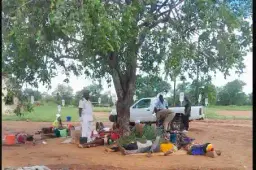The Permanent Secretary of the Ministry of Information, Publicity and Broadcasting Services, Nick Mangwana has explained the viral picture showing health workers administering drips on cholera patients under a tree in Chiredzi.
The picture, which was published online, shows health workers at one of the so-called “community rehydration centres” at Mapanza in Chiredzi administering intravenous (IV) infusion to patients sprawled on the ground under a tree.
The drip was hanging from the tree branches.
Posting on X (formerly Twitter) this Monday, Mangwana said the patients were being attended to by a Rapid Response Team that had been dispatched to treat them on-site. He said:
When a Cholera case or cholera outbreak is registered, Health Authorities will dispatch a Rapid Response Team to the place
The suspected cases are promptly treated-onsite because when it comes to cholera treatment, every minute counts.
Whilst treatment is done tents will organized and pitched. This was the case in the Mapanza area of Chiredzi.
The current cholera outbreak is affecting several countries in the region. According to WHO, the long-term solution for cholera control lies in economic development and universal access to safe drinking water and basic sanitation.
President Emmerson Mnangagwa’s spokesman George Charamba on Sunday hit back at criticism that the Government had failed to invest in a functioning health service. He wrote on X:
By the way, who bought the life-saving saline fluid? Who employed and meets the salaries of the hard-working staff? The vehicle which ferried them to the affected areas?
We thank the medical staff for creative field remedial intervention. Residents of never-never ivory towers stupidly would rather you had lost precious time ferrying distressed patients to a building called a clinic or hospital instead of this life-saving, prompt intervention.
Meanwhile, Ministry of Health and Child Care Permanent Secretary Aspect Maunganidze revealed over the weekend that Cholera has now spread to 58 districts countrywide, with more than 16 000 suspected cases recorded countrywide as of last week.










